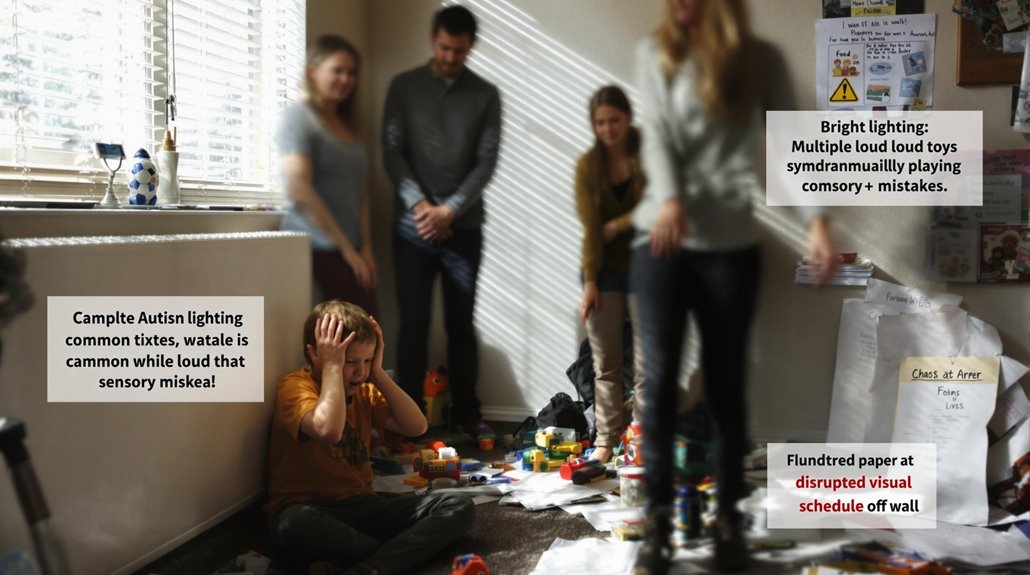When caring for autistic children, we must avoid several key mistakes that can impact their well-being. Let’s never minimize their experiences, force uncomfortable sensory situations, or disrupt routines without warning. We shouldn’t compare them to other children, use complex language, or discourage their special interests. Consistent discipline, professional support, and parental self-care are essential. Understanding these vital “don’ts” will help create a supportive environment where autistic children can truly flourish.
Key Takeaways
- Don’t invalidate or dismiss their experiences and emotions, as this can lead to lasting emotional damage and decreased self-esteem.
- Never force uncomfortable sensory experiences or social interactions that could trigger anxiety or emotional distress.
- Avoid comparing autistic children to neurotypical peers, as this undermines their unique developmental journey and personal achievements.
- Don’t use complex language, idioms, or vague instructions when communicating, as this creates confusion and anxiety.
- Never disrupt routines without proper preparation, as sudden changes can trigger severe emotional dysregulation and distress.
Never Minimize or Invalidate Their Autism Experience
When parents minimize their child’s autism experience by saying things like “everyone feels that way sometimes” or “you’re just being dramatic,” they can cause lasting emotional damage.
Instead, we must embrace autism acceptance and acknowledge that autistic individuals face unique challenges that deserve recognition and support.
Accepting autism means recognizing that autistic people navigate life differently and deserve our understanding, respect, and meaningful support.
We need to validate their experiences by actively listening, showing empathy, and understanding challenges from their perspective.
Every autistic person’s journey is different, and dismissing their struggles can lead to self-doubt and anxiety.
Through personalized care assessments and compassionate support, families can better understand and address their autistic child’s specific needs and challenges.
Avoid Using Complex Language and Metaphors
Just as validating experiences requires careful listening, communicating effectively with autistic children demands thoughtful word choice and clear expression. When we use complex metaphors or abstract language, we risk creating confusion and anxiety.
Instead, we must focus on straightforward communication that leaves no room for misinterpretation. Clear instructions, presented one step at a time, help autistic children process information more effectively.
We should avoid using idioms like “it’s raining cats and dogs” or vague directions like “clean your room.” Rather, let’s break down our communication into simple, concrete terms that create understanding and build confidence.
Similar to how personalized care plans are essential for seniors requiring in-home care, each autistic child needs communication strategies tailored to their unique needs and abilities.
Don’t Disrupt Established Routines Without Warning
Because routines provide essential stability and predictability for autistic children, sudden changes can trigger intense anxiety and emotional dysregulation.
Predictable routines anchor autistic children’s emotional stability, while unexpected disruptions can unleash waves of anxiety and distress.
We can better support our autistic children by implementing thoughtful change strategies and maintaining predictable schedules.
When routine changes are necessary, we must provide advance notice through clear communication and visual schedules.
Let’s guarantee emotional preparedness by offering consistent reminders and using planning tools that help children understand upcoming changes.
We’ll find that establishing strong support networks and maintaining open dialogue about schedule adjustments helps our children feel secure and understood during changes.
Creating a family-centered care approach helps empower parents to better manage routine changes while ensuring their child’s unique healthcare needs are met.
Stop Comparing Them to Other Children
Much like how routines provide stability, understanding each child’s unique journey is fundamental to supporting autistic children.
When we compare autistic children to their peers or siblings, we risk damaging their self-esteem and overlooking their individual achievements. Instead, we should focus on celebrating their personal growth and milestones.
Peer comparisons can create unnecessary pressure and anxiety, potentially hindering progress rather than fostering it.
Let’s concentrate on each child’s strengths, interests, and developmental pace. By practicing self-esteem building through positive reinforcement and acknowledgment of their unique qualities, we help autistic children develop confidence and self-acceptance.
Similar to how personalized care plans are essential in geriatric care, each autistic child requires an individualized approach that recognizes their specific needs and abilities.
Never Force Uncomfortable Sensory Experiences
While sensory sensitivities vary among autistic children, forcing them into uncomfortable sensory experiences can be traumatic and counterproductive to their development.
We must respect their sensory preferences and understand that avoidance isn’t stubbornness – it’s self-protection.
Instead of pushing children beyond their comfort zones, let’s create environments that accommodate their needs. This means reducing loud noises, dimming bright lights, or providing alternatives to scratchy clothing.
Similar to how memory care solutions are tailored to address individual challenges, sensory accommodations should be personalized to each child’s specific needs.
Don’t Leave Them Unsupervised for Long Periods
Although many autistic children demonstrate remarkable independence in certain areas, leaving them unsupervised for extended periods can pose serious safety risks.
While autistic children often excel independently in specific tasks, unsupervised time must be carefully managed to ensure their safety and wellbeing.
We need to implement effective supervision strategies while respecting their growing autonomy. Regular check-ins and safety tips can help create a secure environment that supports their development.
- Install safety devices like door alarms and establish clear boundaries within safe zones where they can explore independently
- Create a structured routine with designated supervision times and appropriate activities for brief moments alone
- Use visual schedules and timers to help them understand when an adult will return, reducing anxiety about temporary separations
Similar to Medicaid home care services, having a qualified caregiver present can ensure proper monitoring while supporting the child’s developmental needs.
Resist Dismissing Their Emotional Expressions
Beyond maintaining physical safety through supervision, we must recognize and validate the emotional experiences of autistic children. Their feelings are real and valid, even when expressed differently than we might expect.
Through emotional validation and active listening, we create a foundation of trust and understanding.
Empathy training begins with us as caregivers. When we dismiss or minimize their emotions, we risk damaging their self-worth and ability to process feelings effectively.
Instead, let’s acknowledge their experiences, help them identify emotions, and create safe spaces for expression. This approach strengthens their emotional intelligence and builds lasting confidence.
Professional support through crisis intervention services can provide additional emotional guidance when families feel overwhelmed managing their child’s unique emotional needs.
Never Discourage Their Special Interests
Special interests form a vital cornerstone of an autistic child’s development and well-being, yet many caregivers mistakenly try to redirect or suppress these passions.
We must understand that nurturing these intense interests isn’t just about keeping them happy – it’s essential for their cognitive growth, self-confidence, and emotional regulation.
- Special interests often lead to expertise and potential career paths
- These passions serve as powerful motivators for learning and social connections
- Engaging with their interests creates opportunities for meaningful bonding
When we support rather than discourage their focused interests, we’re helping autistic children develop their strengths while building trust and understanding.
Let’s celebrate and nurture these passions as the valuable assets they truly are.
At Focus Family Care, Special Needs & Disability support services help families embrace and cultivate their autistic child’s unique interests through customized care plans.
Don’t Use Inconsistent Discipline Methods
When disciplining an autistic child, consistency becomes the cornerstone of effective behavioral guidance. We must establish clear rules and stick to them, as inconsistent discipline can create confusion, anxiety, and emotional distress.
Children on the spectrum thrive when they understand exactly what’s expected of them and what consequences will follow specific behaviors.
We need to pair our disciplinary approach with emotional support, ensuring our children feel safe and understood even when being corrected.
Similar to how structured daily routines help those with memory challenges maintain stability, consistent discipline provides essential predictability for autistic children.
Avoid Neglecting Professional Support and Resources
Although raising an autistic child brings unique challenges, we shouldn’t try to handle everything on our own.
Professional support and community resources are essential for providing the best care possible for our children. These partnerships help us understand effective strategies while connecting us with others who share similar experiences.
- Seek regular professional development opportunities to learn about the latest autism research and interventions
- Connect with local support groups and community resources that offer specialized programs
- Build relationships with occupational therapists, speech therapists, and behavioral specialists who can provide expert guidance
Together, we’re stronger.
In unity, we find the strength to overcome challenges and create better outcomes for our children with autism.
When we embrace available resources, we create a robust support system that benefits both our children and ourselves as caregivers.
Skilled nursing care and therapy services can significantly enhance your child’s development through personalized treatment plans and ongoing clinical assessments.
Remember to Take Care of Yourself as a Parent
Professional support provides essential resources, but we can’t pour from an empty cup. As parents of autistic children, we must prioritize self care strategies to maintain our emotional and physical well-being. This isn’t selfish – it’s necessary for sustainable caregiving.
Seeking parental support through support groups, counseling, or even brief respite care allows us to recharge and return to our children with renewed energy and patience.
When we’re well-rested and emotionally balanced, we’re better equipped to handle challenges, maintain consistency, and provide the understanding environment our children need to thrive.
Conclusion
Raising an autistic child is like steering through a unique constellation – each star represents a different need, challenge, and triumph. We’ve explored critical approaches to avoid, but remember that every child’s journey is distinct. By staying informed, compassionate, and mindful of these guidelines, we’re better equipped to support our children’s growth. Together, we can create environments where autistic children flourish, celebrating their individuality while providing the understanding they deserve.





